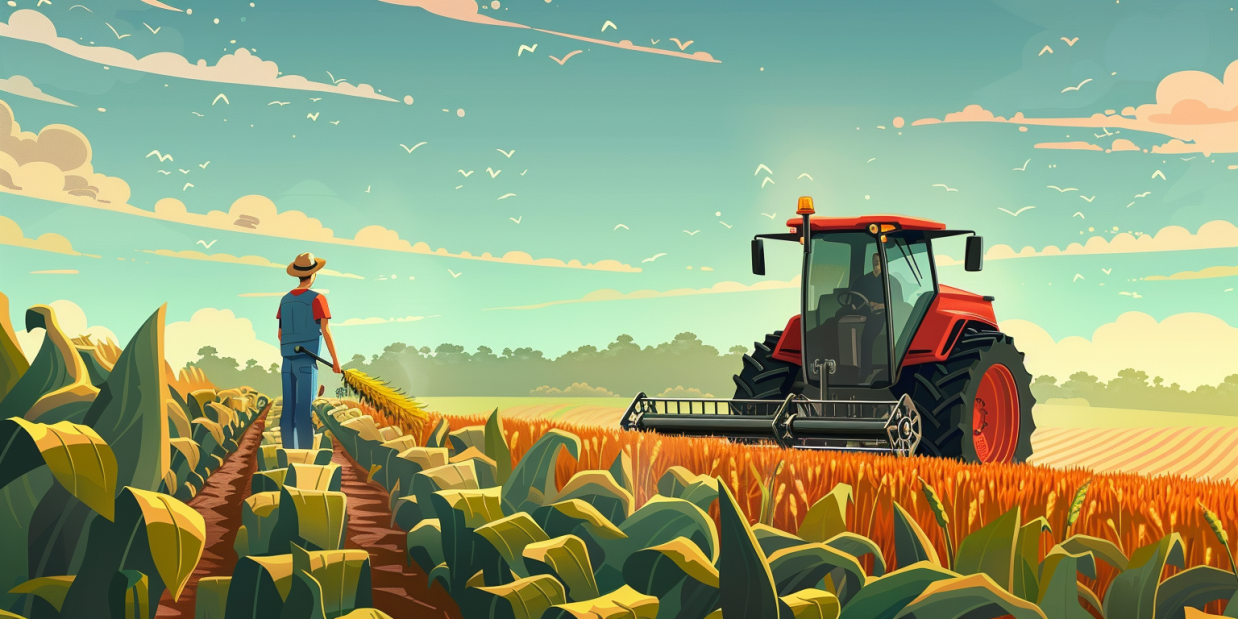AI in Agriculture: Farming Jobs in the Digital Age
AI revolutionizes farming, boosting productivity, sustainability, and food security. Explore precision ag, automation, crop monitoring, and evolving farmer roles. Learn new skills and seize digital farming opportunities.
Get referred to your dream company
Sections
The agricultural sector, the backbone of human civilization for millennia, is undergoing a profound transformation. Artificial Intelligence (AI) is at the forefront of this revolution, promising to redefine farming jobs and enhance productivity, sustainability, and food security. This blog post explores the seismic shifts AI is bringing to agriculture and what this digital age means for farmers and the sector at large.
Revolutionizing Farming with AI
AI technologies are being deployed across the agricultural spectrum, from precision farming to supply chain management. These innovations are not just improving efficiency but are also helping tackle some of the most pressing challenges faced by the industry, including climate change, labor shortages, and the need for sustainable practices.
Precision Agriculture
At the heart of AI's impact on farming is precision agriculture, which uses AI and data analytics to make farming practices more precise and controlled. AI-driven systems analyze data from various sources, including satellites and on-field sensors, to inform decisions such as when to plant, irrigate, and harvest crops. This precision saves resources and increases yields, making farming more sustainable and profitable.
Automated Machinery
AI is also powering the development of autonomous tractors, drones, and robotic systems that can perform tasks such as planting, weeding, and harvesting without human intervention. These technologies reduce the need for manual labor, a significant advantage in regions facing agricultural labor shortages.
Crop Monitoring and Disease Detection
AI-enabled drones and imaging technologies offer unprecedented insights into crop health, allowing for early detection of pests, diseases, and nutritional deficiencies. By identifying issues early, farmers can take targeted action to mitigate risks, reducing the reliance on broad-spectrum pesticides and enhancing crop health.
The Evolving Role of Farmers
The integration of AI into agriculture is not replacing farmers but rather augmenting their roles. Farmers are becoming more tech-savvy, using data and AI insights to make informed decisions. The future farmer is part agronomist, part data scientist, adept at interpreting AI-driven insights to optimize farm operations.
New Skills and Opportunities
As farming becomes more data-driven, there is a growing demand for skills in digital literacy, data analysis, and technology management within the agricultural sector. This shift is creating new job categories within agriculture, including precision agriculture specialists, agricultural data analysts, and drone operators.
Challenges and Adaptation
The transition to AI-driven agriculture is not without its challenges. There is a need for significant investment in technology and training to equip farmers with the skills and tools they need. Additionally, there are concerns about data ownership and privacy, as well as ensuring that small-scale and traditional farmers are not left behind in the digital transformation.
The Future of Farming Jobs
The impact of AI on farming jobs is complex. On one hand, automation and AI technologies can reduce the demand for manual labor in certain tasks. On the other hand, they are creating new opportunities for tech-oriented roles within the agricultural sector. The key to navigating this transition is education and training, ensuring the existing and future workforce is prepared for the digital age of agriculture.
Bridging the Digital Divide
Ensuring equitable access to AI technologies and training is crucial. Initiatives to bridge the digital divide, such as government subsidies for AI technology, partnerships between tech companies and farming communities, and educational programs in rural areas, can help ensure that the benefits of AI in agriculture are widely shared.
Sustainability and Ethical Considerations
As AI reshapes agriculture, it's essential to prioritize sustainability and ethical considerations. AI offers tools to make farming more sustainable, but it's crucial to develop these technologies in a way that respects the environment, farmers, and communities. Engaging farmers in the development and implementation of AI technologies ensures that these innovations meet their needs and support sustainable practices.
Conclusion
AI in agriculture is more than a technological upgrade; it's a paradigm shift that redefines what it means to be a farmer in the digital age. By embracing AI, the agricultural sector can address some of its most significant challenges, transforming farming into a high-tech profession that's at the forefront of sustainability and efficiency. For farmers, adapting to this new landscape means embracing new skills and technologies, positioning themselves as key players in the global effort to create a sustainable, secure, and efficient food system for the future. In this digital age, farmers and AI technologies are partners in the vital task of feeding the world, making agriculture an exciting field of innovation and growth.
Your career is worth investing in.
Get unlimited referrals with Premium.
Community
© 2025 Crucible Fund LLC. All rights reserved.
